![]()

A
historic gathering unites nursing leaders
from Albania to Zimbabwe in the global effort
to lessen the workforce shortage and
improve delivery of health care
by Pam Auchmutey and Holly Korschun
In
troubled times such as these, the most important thing we can do is stay
true to our values and make the world a better place.
—Dr. Michael Johns,
executive vice president for
health affairs and director,
Woodruff Health Sciences Center

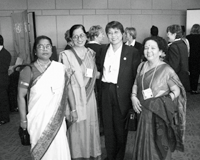
Even in the wake of September 11, nursing and health leaders from 60 countries traveled to Atlanta to build new nursing workforce strategies together. In Dean Marla Salmon’s view, “Their commitment and work during the five days was truly inspiring and unforgettable.”

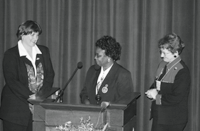
Dorothy Chikampa (center) of the Zambia Nurses’ Association accepts the award for Leadership in Improving the Health of Vulnerable People. She is pictured with Marla Salmon (left) and Judith Oulton of the International Council of Nurses.

You
who are health providers must also be agents of forgiveness, of reconciliation,
of ubuntu (the essence of being human). For you see, we are created
for togetherness, we are created for harmony, we are created for family.
—Desmond Tutu, archbishop of
South Africa and Nobel laureate

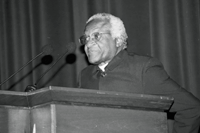
Desmond
Tutu, known worldwide for his efforts to reconcile differences among people,
received the award for Enhancing Human Health Through Humanitarianism.

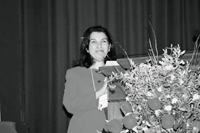
Dr. Naeema Al-Gasseer, senior scientist for nursing and midwifery with
the World Health Organization, was one of many key conference planners.

My mother, who I’m sure is in heaven, would be surprised
and pleased that I’m a nurse.
—Jimmy
Carter, former US president
and the first honorary nurse
fellow of the Lillian Carter Center
for International Nursing

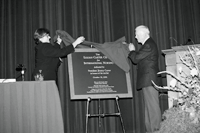 .
.
Dean Marla Salmon and former US President Jimmy
Carter unveil a plaque to commemorate the dedication of the Lillian Carter
Center for International Nursing. During her lifetime, Miss Lillian served
as a community nurse in Georgia and a Peace Corps volunteer in India.
She also was an adviser to the School of Nursing on its international
programs.
Make no mistake about
it. Nursing leaders around the world are doing their part to stem the
shortage of nurses and improve the delivery of health care. Many of their
respective tasks will take months or years to complete, whether it’s
standardizing and strengthening the curriculum for nursing students, making
the workplace safer for nurses in hospitals and clinics, or providing
new incentives to attract new professionals and retain experienced veterans.
In some nations, emerging diseases threaten the very lives of nurses who
care for patients. While resolving any one of these problems is challenging
in its own right, it is that much harder for nurses in countries where
financial resources are scarce and progress is hampered by unstable government,
a poor economy, a weak infrastructure, or even civil war.
Whatever their situation, nursing leaders today are more united in their
endeavors because of the Nell Hodgson Woodruff School of Nursing. Last
fall, the school brought nursing professionals and health care experts
from more than 60 countries together in Atlanta to find better ways of
working together to improve the quality of health care and attack the
critical shortage of nurses worldwide. The Global Nursing Partnerships
conference was the first major initiative of the Lillian Carter Center
for International Nursing (LCCIN), established last year by the School
of Nursing to address nursing workforce issues and provide education,
research, and leadership development opportunities for nursing students
and practicing nurses in and outside of the United States.
By the time the conference ended, it had set a precedent. It was the first
time that government chief nursing officers (CNOs), international and
national nursing association (NNA) leaders, and human resource planners
had come together on so large a scale. “They helped build a common
strategy to improve health that underscores the importance of outreach
and alliance-building at all levels—local, regional, and national,”
said Naeema Al-Gasseer, senior scientist for nursing and midwifery with
the World Health Organization (WHO).
The gathering also marked a professional milestone for the nursing school
and its dean, Marla Salmon, who was asked by the International Council
of Nurses (ICN) to host a global forum in conjunction with international
nursing work under way at Emory. During the forum, government CNOs asked
that the School of Nursing serve as the secretariat for their global network,
continuing to host similar events and providing an ongoing focal point
for leadership development for nurses worldwide. As secretariat, the School
of Nursing will put forth strategies to address the global nursing shortage,
formally recognized in a proclamation issued by WHO last year.
“The nursing school was privileged to be the lead force in the most
remarkable gathering of key leaders I have ever experienced,” said
Salmon, who directs the LCCIN. “Because we were able to provide scholarship
support, in part through the generosity of donors, we were able to bring
all country partners who applied from the least developed parts of the
world. Their commitment and work during the five days was truly inspiring.”
Two years in the making, the conference provided an opportunity for the
nursing school and the Woodruff Health Sciences Center to take the lead
in addressing global nursing issues with input from WHO; the ICN; the
governments of the United Kingdom, Canada, and the United States; and
The Carter Center, where much of the conference was held. It also showcased
the strong working relationship between The Carter Center and Emory, which
share similar goals. “Both partners are committed to improving the
health of people worldwide, and nurses play an important role in that
effort,” said John Hardman, executive director of The Carter Center.
“They also work closely with the World Health Organization to provide
better health care for all, which includes building and maintaining the
nursing workforce.”
Just as important, more than 250 nursing and health leaders from Albania
to Zimbabwe opted to attend the gathering after terrorists attacked the
United States in September. Some participants traveled several days to
reach Atlanta.
“In troubled times such as these, the most important thing we can
do is stay true to our values and make the world a better place,”
said Michael Johns, Emory’s executive vice president for health affairs,
during the October conference.
Jeffrey Koplan, director of the Centers for Disease Control and Prevention
at the time, could not attend because of September 11 but was with the
participants in spirit. “Nurses are vital to improving the health
care of people in a world where social and economic disparities greatly
impact access to and quality of care,” said Koplan, now vice president
for academic health affairs at Emory. “It’s imperative that
we build and maintain a strong nursing workforce. Otherwise, the health
of people will be at greater risk.”
Learning and sharing together
Those comments seemed all the more poignant as nursing leaders, some of
whom had never worked together before, sat down with each other to learn
new skills and create joint plans of action for tackling the most pressing
problems facing their countries in nursing and health care. Through this
process, nurses from developed and developing countries alike shared ideas
and learned from each other.
“The conference was important because we could observe and listen
to colleagues who have gone through similar experiences,” Elizabeth
Solis Archilla, director of nursing at San Juan de Dios General Hospital,
and Irma Yolanda Chávez, director of nursing at Rafael Landivar
University, wrote recently from Guatemala. Both are grappling with losing
the country’s chief nursing officer position as a result of national
health care reform. “By the end of the conference, we concluded that
we need to fight to have this position recreated,” they said. “Countries
that have this position lack the difficulties we are facing with communication
and unification of interests among trade associations, education, and
service.”
Although CNOs and NNA leaders have met regionally for several years, the
Global Nursing Partnerships conference was the largest international gathering
of its kind and the first to focus on building partnerships. As Judith
Oulton, ICN chief executive officer pointed out, “The global nursing
shortage, acute in so many regions, can only be solved through serious
and strategic partnerships between national nursing associations, government
representatives, and human resource planners.”
To forge those partnerships, the event began with three days of separate
and then joint working meetings that included networking forums for government
CNOs and NNA leaders and sessions on problem solving, strategic planning,
and developing partnerships. “Nurses need to work together,”
noted US Division of Nursing Director Denise Geolot, who led a strategic
planning session for CNOs. “We need to collaborate if we are going
to move the agenda to improve health care and make sure there is access
through nursing. When you share common experiences and interests, it facilitates
working together by breaking down barriers.”
During the final two days, national human resource directors and health
planners joined CNOs and NNA leaders to address nursing workforce issues
around the world. In the process, they heard from an impressive group
of experts, including Bobby Jindal, assistant secretary of the US Department
of Health and Human Services; James Buchan, a professor specializing in
nursing workforce planning at Queen Margaret University College in Scotland;
Andrew Green, a health economics and planning expert at the University
of Leeds in the United Kingdom; and Pedro Brito, human resources development
coordinator with the Pan American Health Organization.
Based on the action plans that participants developed during their last
day together, it’s clear that many are striving for the same goals—ensuring
that nurses are represented on health policy committees, standardizing
nursing education (basic as well as continuing education), developing
new programs to meet the health care needs of their nations (especially
in rural areas), and defining what elements are needed to create national
databases on the nursing workforce.
What also was apparent is that no single blueprint exists for resolving
any one of these issues. What works for recruiting nursing students and
keeping nurses on the job in Scotland (where more than 35,000 nurses and
midwives serve a population of 5.1 million and the nursing workforce has
remained stable in recent years) won’t work in Ghana (which has a
public health workforce of 29,000 and a population of 18.4 million). In
Jamaica, the nursing workforce also is spread thin, with 12 professional
nurses for every 100,000 people. That’s in addition to the threat
of violence that hospital nurses face traveling to and from work in the
capital city of Kingston and the personal health risks of caring for patients
with HIV/AIDS.
Despite such overwhelming obstacles, one underlying message rang through
loud and clear for participants. As the backbone of health care, nurses
must toot their horns more loudly to shape workforce policy and improve
patient outcomes. “Nurses don’t do this enough,” said Linda
Aiken, director of the Center for Health Outcomes and Policy Research
at the University of Pennsylvania. “Their ideas are often unknown
to government leaders. Nurses must translate their research findings into
terms (financial and otherwise) that decision-makers understand.”
Consequently, many who attended the LCCIN’s first conference left
with ambitious agendas for propelling their profession and health care
delivery forward. Nursing leaders from Namibia aim to reduce their nation’s
maternal mortality rate, boost the morale of nurses, revive the nation’s
nursing association, and push for legislation to unify and strengthen
their profession. Their colleagues in Bangladesh have set out to improve
the quality of nursing care, raise the status of their profession, and
more clearly define the responsibilities of their CNO and NNA. In Uzbekistan,
nursing leaders aspire to reform graduate nursing education and create
a national center for nursing training.
Ambassadors of peace through health
Along with their newfound knowledge, nursing leaders took away a renewed
sense of hope and inspiration from former US President Jimmy Carter and
South African Archbishop Desmond Tutu, both participants in the conference.
Carter happily joined their ranks when Salmon named him as the LCCIN’s
first honorary nurse fellow. “My mother, who I’m sure is in
heaven, would be surprised and pleased that I’m a nurse,” Carter
said.
He was there to dedicate the center named for the late Miss Lillian, who
served as a community nurse, Peace Corps volunteer, and adviser on the
School of Nursing’s international programs. Her famous son grew up
in Plains, Georgia, surrounded by respected nurses like his mother, who
often was the only link between life and death for poor black farming
families struck by illness.
Tutu formed a special bond with nurses early in life as well. When tuberculosis
landed him in the hospital as a teenager, he developed a crush on his
nurse. The smitten teen grew up to receive a Nobel Peace Prize for his
efforts to end apartheid in South Africa. “You who are health providers
must also be agents of forgiveness, of reconciliation, of ubuntu (the
essence of being human),” he told participants. “For you see,
we are created for togetherness, we are created for harmony, we are created
for family.”
The archbishop added another honor to his credit when the LCCIN presented
him with an award recognizing his efforts to enhance human health through
humanitarianism. Additionally, the LCCIN gave awards to the Zambia Nurses’
Association for improving the health of mothers and children through the
Kaloko Safe Motherhood Project and to Richard and Verna Huffman Splane
of Canada for their groundbreaking work to document the role of chief
nursing officers worldwide.
Just as important, nursing leaders at the Global Nursing Partnerships
conference were lauded for their service as ambassadors of peace through
health. “There is no entity on earth that knows the suffering of
people better than nurses,” President Carter said.
In his view, politicians could learn a thing or two from nurses at the
bedside. “That is where love is shown in its purest form,” he
added. “I hope you return to your homes with a renewed commitment
to let your voices be heard.”